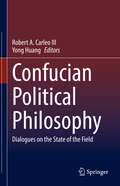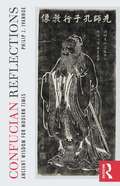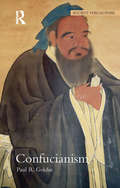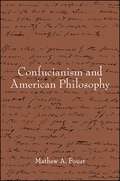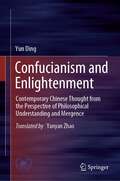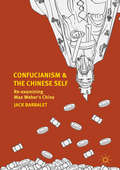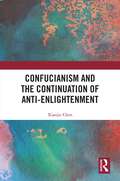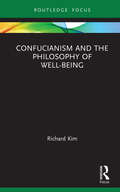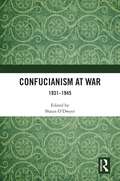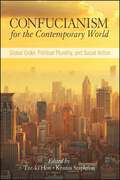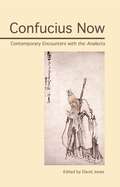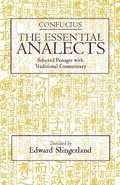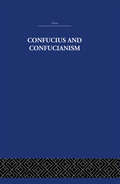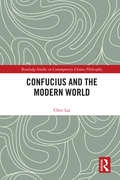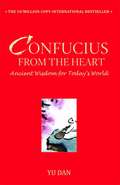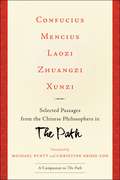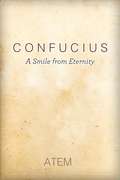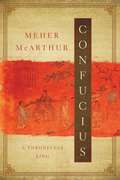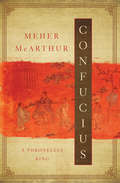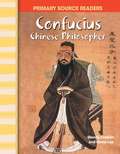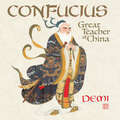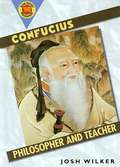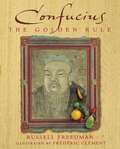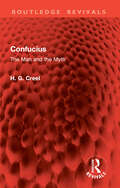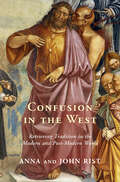- Table View
- List View
Confucian Political Philosophy: Dialogues on the State of the Field
by Yong Huang Robert A. CarleoThis book debates the values and ideals of Confucian politics—harmony, virtue, freedom, justice, order—and what these ideals mean for Confucian political philosophy today. The authors deliberate these eminent topics in five debates centering on recent innovative and influential publications in the field. Challenging and building on those works, the dialogues consider the roles of benevolence, family determination, public reason, distributive justice, and social stability in Confucian political philosophy. In response, the authors defend their views and evaluate their critics in turn. Taking up a broad range of crucial issues—autonomy, liberty, democracy, political legitimacy, human welfare—these author-meets-critic debates will appeal to scholars interested in political, comparative, and East Asian philosophy. Their interlaced themes weave a portrait of what is at stake in discussing Confucian values and theory. Most importantly, they engage and develop the state of the field of Confucian political philosophy today.
Confucian Reflections: Ancient Wisdom for Modern Times
by Philip J IvanhoeConfucian Reflections: Ancient Wisdom for Modern Times is about the early Chinese Confucian classic the "Analects" Lunyu, attributed to the founder of the Confucian tradition, Kongzi (551-479 bce) and who is more commonly referred to as "Confucius" in the West. Philip J. Ivanhoe argues that the Analects is as relevant and important today as it has proven to be over the course of its more than 2000 year history, not only for the people who live in East Asian societies but for all human beings. The fact that this text has inspired so many talented people for so long, across a range of complex, creative, rich, and fascinating cultures offers a strong prima facie reason for thinking that the insights the Analects contains are not bound by either the particular time or cultural context in which the text took shape.
Confucianism (Ancient Philosophies Ser. #9)
by Paul R. Goldin"Confucianism" presents the history and salient tenets of Confucian thought, and discusses its viability, from both a social and a philosophical point of view, in the modern world. Despite most of the major Confucian texts having been translated into English, there remains a surprising lack of straightforward textbooks on Confucian philosophy in any Western language. Those that do exist are often oriented from the point of view of Western philosophy - or, worse, a peculiar school of thought within Western philosophy - and advance correspondingly skewed interpretations of Confucianism. This book seeks to rectify this situation. It guides readers through the philosophies of the three major classical Confucians: Confucius (551-479 BCE), Mencius (372-289 BCE?) and Xunzi (fl. 3rd cent. BCE), and concludes with an overview of later Confucian revivals and the standing of Confucianism today.
Confucianism and American Philosophy (SUNY series in Chinese Philosophy and Culture)
by Mathew A. FoustIn this highly original work, Mathew A. Foust breaks new ground in comparative studies through his exploration of the connections between Confucianism and the American Transcendentalist and Pragmatist movements. In his examination of a broad range of philosophers, including Confucius, Mencius, Xunzi, Ralph Waldo Emerson, Henry David Thoreau, Charles Peirce, William James, and Josiah Royce, Foust traces direct lines of influence from early translations of Confucian texts and brings to light conceptual affinities that have been previously overlooked. Combining resources from both traditions, Confucianism and American Philosophy offers fresh insights into contemporary problems and exemplifies the potential of cross-cultural dialogue in an increasingly pluralistic world.
Confucianism and Enlightenment: Contemporary Chinese Thought from the Perspective of Philosophical Understanding and Mergence
by Yun DingThis book presents twelve of the author’s selected essays on subjects related to contemporary Chinese thought and examines other significant works on the history of Chinese philosophy. By combing the basic political discourse on Confucianism, it highlights the significance of Confucian Socialism in the present day and explains the author’s reflections on the philosophy and modernization of Chinese thought. This book is a valuable resource for experts and scholars as well as for general readers who have an understanding of contemporary Chinese philosophy, offering deep insights into current Chinese thought and Confucian modernization.
Confucianism and the Chinese Self: Re-examining Max Weber’s China
by Jack BarbaletSetting the context for the upheavals and transformations of contemporary China, this text provides a re-assessment of Max Weber's celebrated sociology of China. Returning to the sources drawn on by Weber in The Religion of China: Confucianism and Taoism, it offers an informed account of the Chinese institutions discussed and a concise discussion of Weber's writings on 'the rise of modern capitalism'. Notably it subjects Weber's argument to critical scrutiny, arguing that he drew upon sources which infused the central European imagination of the time, constructing a sense of China in Europe, whilst European writers were constructing a particular image of imperial China and its Confucian framework. Re-examining Weber's discussion of the role of the individual in Confucian thought and the subordination, in China, of the interests of the individual to those of the political community and the ancestral clan, this book offers a cutting edge contribution to the continuing debate on Weber's RoC in East Asia today, against the background of the rise of modern capitalism in the "little dragons" of Singapore, Taiwan, Hong Kong and South Korea, and the "big dragons" of Japan and the People's Republic of China.
Confucianism and the Continuation of Anti-Enlightenment
by Xiaojie ChenIn 18th-century Europe, before the “Counter-Enlightenment,” two coexisting perspectives emerged within the Enlightenment: the first was the belief that humans were endowed with the capacity to think independently, which led to the possibility of egalitarianism; the second was the restriction of the faculty’s scope of application, which argued that the people must rely on intellectuals as their new shepherds. The latter is “Anti-Enlightenment” and anti-egalitarian.This book argues that Neo-Confucianism showed these two Enlightenment trends after the 11th century. The imperial examination reform allowed commoners to rise to the bureaucratic elite, thereby achieving top-down “Enlightenment”. Despite the emerging elite’s claims of caring for the people, this benevolence does not expect the people to become self-sufficient adults, which brings up this book’s second theme of comparing French Revolution “Fraternity” with Confucian “Benevolence.”Taking “Enlightenment” and “Fraternity” as clues, the author analyses the intellectual history in four countries (China, Japan, Germany, and France), revealing not only the inherent “Anti-Enlightenment” mentality within the European Enlightenment, but also the process of “Enlightenment” commenced as early as the 11th century in China.This book will appeal to scholars of Enlightenment, intellectual history, and comparative study of East-West thought.
Confucianism and the Philosophy of Well-Being (Routledge Focus on Philosophy)
by Richard KimWell-being is topic of perennial concern. It has been of significant interest to scholars across disciplines, culture, and time. But like morality, conceptions of well-being are deeply shaped and influenced by one’s particular social and cultural context. We ought to pursue, therefore, a cross-cultural understanding of well-being and moral psychology by taking seriously reflections from a variety of moral traditions. This book develops a Confucian account of well-being, considering contemporary accounts of ethics and virtue in light of early Confucian thought and philosophy. Its distinctive approach lies in the integration of Confucian moral philosophy, contemporary empirical psychology, and contemporary philosophical accounts of well-being. Richard Kim organizes the book around four main areas: the conception of virtues in early Confucianism and the way that they advance both individual and communal well-being; the role of Confucian ritual practices in familial and communal ties; the developmental structure of human life and its culmination in the achievement of sagehood; and the sense of joy that the early Confucians believed was central to the virtuous and happy life.
Confucianism at War: 1931–1945
by Shaun O’DwyerThis is the first book-length study of wartime Confucianism in any language, providing new insights into key developments in Confucian thought and ideology in East Asia in the 1930s and 1940s.In standard scholarship on the ideologies driving nation-building and imperialism during the era of Japanese expansionism that began in 1931, Confucianism is rarely referenced and relegated to the background. This volume brings together the work of scholars who argue for a revision of this standard view. It includes studies of Japanese, Chinese, colonial Manchurian, and Korean intellectuals and reformers who contributed to expansionist, collaborationist, or nationalist ideology-building during the war. Contrary to the assumption that Confucianism was an anachronism rendered irrelevant by the Westernizing political reforms and revolutions of the early twentieth century, the chapters in this book show that Confucianism remained a potent and also contested cultural resource for promoting national cohesion, war mobilization and expansionism in East Asia between the Japanese invasion of Manchuria in 1931 and the end of World War II in 1945. This book will appeal to scholars and students of Asian studies, nationalism studies, postcolonial studies, religious studies, and philosophy. In particular, it is essential reading for those interested in nationalism and modern Confucian thought in East Asia.
Confucianism for the Contemporary World: Global Order, Political Plurality, and Social Action (SUNY series in Chinese Philosophy and Culture)
by Kristin Stapleton; Tze-ki HonCondemned during the Maoist era as a relic of feudalism, Confucianism enjoyed a robust revival in post-Mao China as China's economy began its rapid expansion and gradual integration into the global economy. Associated with economic development, individual growth, and social progress by its advocates, Confucianism became a potent force in shaping politics and society in mainland China, Hong Kong, Taiwan, and overseas Chinese communities. This book links the contemporary Confucian revival to debates—both within and outside China—about global capitalism, East Asian modernity, political reforms, civil society, and human alienation. The contributors offer fresh insights on the contemporary Confucian revival as a broad cultural phenomenon, encompassing an interpretation of Confucian moral teaching; a theory of political action; a vision of social justice; and a perspective for a new global order, in addition to demonstrating that Confucianism is capable of addressing a wide range of social and political issues in the twenty-first century.
Confucius Now
by David JonesWritten by the most important scholars in contemporary Confucian studies, these approachable essays focus on the relevance of Confucius's ideas to modern living, with special attention given to the Analects, his seminal text. Topics covered include tradition and creativity, grief and mourning, the doctrine of correcting names, Confucian kungfu, and moral cultivation.
Confucius The Essential Analects: Selected Passages With Traditional Commentary
by Confucius Edward SlingerlandThe Essential Analects offers a representative selection from Edward Slingerland's acclaimed translation of the full work, including passages covering all major themes. An appendix of selected traditional commentaries keyed to each passage provides access to the text and to its reception and interpretation. Also included are a glossary of terms and short biographies of the disciples of Confucius and the traditional commentators cited.
Confucius and Confucianism
by Richard WilhelmFirst published in 1931. This re-issues the edition of 1972. This translation and Wilhelm's invaluable commentaries provide a concise and readable survey of Confucius, the man and his teachings. This volume translates The Life of Confucius from an ancient Chinese text, the Shih Chi, or The Historical Records by Sse-Ma Ch'ien, dating from the turn of the second century B.C.
Confucius and the Modern World (Routledge Studies in Contemporary Chinese Philosophy)
by Lai ChenThis book represents the cutting edge of theoretical works on Confucianism. Starting from Confucianism’s comeback in modern China and ending with the proposal of the new philosophical concept of “multiple universality” in the face of the world culture, the author conducts an in-depth analysis and discussion of many facets of the relationship between Confucianism, Confucian traditions and the modern world culture. <P><P> It has a focused theme and a strong sense of contemporaneity, and responds to the current challenges confronting Confucianism from the perspective of modern culture. The chapters not only elucidate the Confucian position in the face of challenges of global ethics, dialogues on human rights, and ecological civilization, but also provide a modern interpretation of classical Confucian ideas on education, politics and ritual politics as well as an analysis of the development of modern Confucianism. All in all, this work is a comprehensive exposition of the Confucian values and their modern implications.
Confucius from the Heart
by Esther Tyldesley Yu DanThis book is a compilation of teachings - called 'Analects' - written by Confucius's students after his death.The author has also incorporated some of her own experiences and stories.
Confucius, Mencius, Laozi, Zhuangzi, Xunzi: Selected Passages from the Chinese Philosophers in The Path
by Christine Gross-Loh Michael PuettAn ebook companion to The Path by Michael Puett and Christine Gross-Loh that puts together a broad selection of translated excerpts from the ancient works of Chinese philosophy discussed in the book.This free ebook gives readers a chance to deepen their understanding of The Path by Michael Puett & Christine Gross-Loh by reading translated excerpts from the original works of Chinese philosophy discussed in the book. It includes selections from the teachings of Confucius, the Mohists, Mencius, Laozi, Zhuangzi, and Xunzi, among others.
Confucius: A Smile from Eternity
by Atem“When Tsze sat himself down upon a big rock, he said to the Earth:‘Why is it that you are always so hard to manage?’And the Earth said to Tsze:‘Because the Great One created me so that you might learn your lessons.’”Confucius is the Latin name of the great Chinese philosopher Chung-Fu-Tsze. As the Chinese empire was crumbling, Confucius used his erudition and great wisdom to establish order amidst the political and social chaos.He believed in the integrity of law and tradition, and that inner knowledge had to be activated so that virtue, order, and harmony could be suffused into society. For centuries his philosophy has been the foundation of Chinese society.His wisdom is reflected in this series of channelled quotes that capture the humour, profundity, and exquisite simplicity of existence.“The greatest lessons are learned in the stillness of one’s own self.”
Confucius: A Throneless King
by Meher McArthurA Simon & Schuster eBook. Simon & Schuster has a great book for every reader.
Confucius: A Throneless King
by Meher McarthurAn illuminating portrait of Confucius's life and philosophical teachings Confucius is one of the most important figures in Chinese history, a man whose philosophies have shaped world culture. Often overlooked outside his native country, Confucius himself was a fascinating figure. A contemporary of Buddha, Confucius was an outspoken and uncompromising man who revolutionized Chinese society nearly 2,500 years ago, when the country was merely a loose web of feudal provinces. No small feat for the illegitimate son of a retired soldier and a teenage concubine who once received a prophecy from the local fortune-teller that she would give birth to a "throneless king." Perhaps because of these humble beginnings, Confucius had a passionate belief in respect for others and this belief underpinned his life and teachings. He advised the emperors and kings of his day, gaining both their respect and undying enmity. He was equally proud of both achievements, saying that if the evil people of the world liked him, he was doing something wrong. In this enlightening portrait of a great man, the reader will discover how Confucius's theories became the foundation of social structures throughout Asia that still exist today.
Confucius: Chinese Philosopher (Primary Source Readers)
by Wendy Conklin Gisela LeeConfucius is now considered the greatest philosopher in Chinese history. This inspiring and enlightening biography will allow readers to discover Confucius' life of peace and harmony, his beliefs, and his philosophies that people still use today through interesting sidebars, facts, clear photos, supportive text, and a helpful glossary and index. Readers are also introduced to other important aspects of this period in China's history including the Zhou Dynasty, Meng-Tzu, and legalism.
Confucius: Great Teacher of China
by DemiA beautifully illustrated biography of a man whose philosophy shaped the course of Chinese history: the great teacher Confucius.His sayings are repeated throughout the world. His teachings set the course of Chinese society for two and a half millennia. But Confucius (551 BCE--479 BCE) remains merely a name to many readers, rather than the central figure of world history that he deserves to be. Award-winning author-illustrator Demi illuminates his life and influence in this elegant biography that will appeal to readers of all ages. Confucius loved books and learning, but he grew up during a time of great suffering and warfare in China. Troubled by the chaos he saw all around him, he devoted his life to reforming his society and government, with ideas about education and leadership that still resonate today. He encouraged everyone "especially rulers" to live moral lives, emphasizing the value of tradition and compassion. And five hundred years before Jesus set forth his Golden Rule, Confucius declared his Golden Mean: "Never impose on others what you would not choose for yourself."
Confucius: Philosopher and Teacher
by Josh WilkerA biography of the Chinese teacher and sage whose teachings influenced all aspects of Chinese life for many centuries after his death.
Confucius: The Golden Rule
by Russell FreedmanA biography of the Chinese philosopher, intended for young audiences
Confucius: The Man and the Myth (Routledge Revivals)
by H. G. CreelOriginally published in 1932, and therefore inevitably of its time, this book discusses the place of the intellect as a guide to religious truth. The author's work brought principles from Quaker decision-making to bear on wider questions about democracy and religion. The author affirms that the ‘Light Within’, although a personal endowment is not independent of the historical fact that spiritual geniuses in bygone ages have seen and testified and lived.
Confusion in the West: Retrieving Tradition in the Modern and Post-Modern World
by Anna Rist John RistIn their trenchant panoramic overview – ranging from antiquity to the present-day – John and Anna Rist write with authority and ennui about nothing less than the loss of the foundational culture of the West. The authors characterize this culture as the 'original tradition', viewing its erosion as one which has led to anxiety about the entire value of Western thought. The causes of the disintegration are discussed with an intensity rare in academe. Critics of modernity ordinarily concentrate on the Enlightenment and the book certainly offers deep analysis of Enlightenment thought. But it goes further. Thus the cruelty of modern totalitarianism is now depicted as in the spirit of the French Revolution and its implacable hostility to a vanished primordial heritage, while scientism, bureaucracy and consumerism appear as the only rivals to a threatening nihilism. The book argues that Western thought has created a set of conflicting moral and spiritual customs: to the detriment of coherence, in individual minds as in society and culture.
